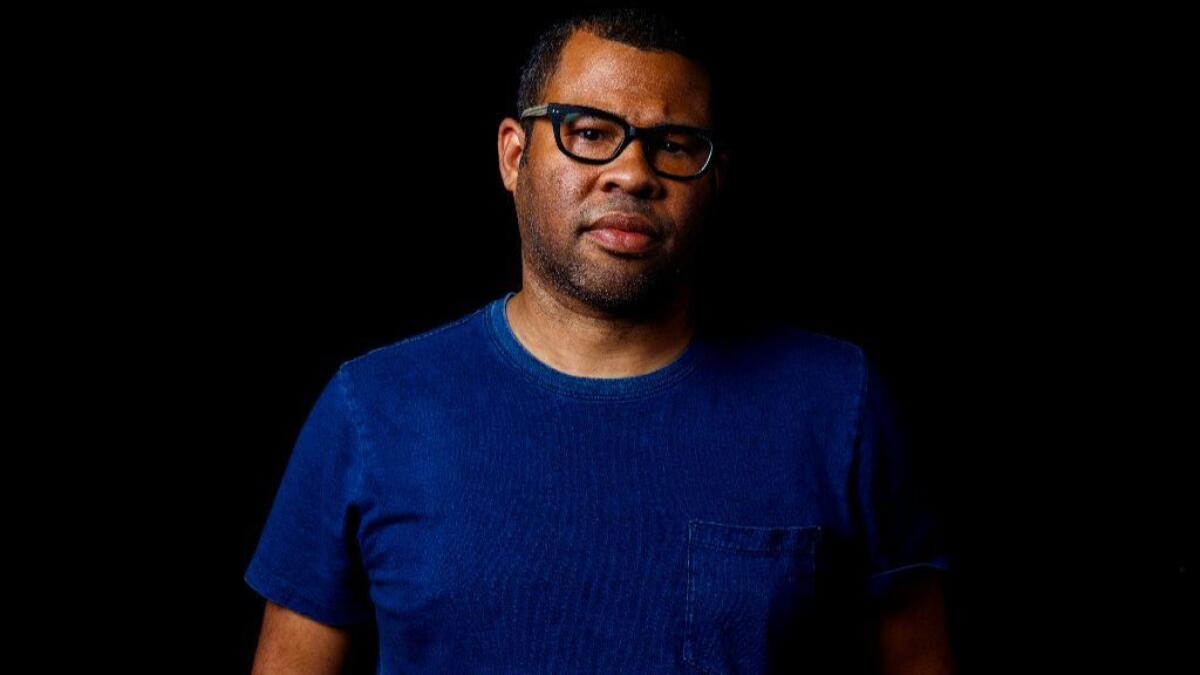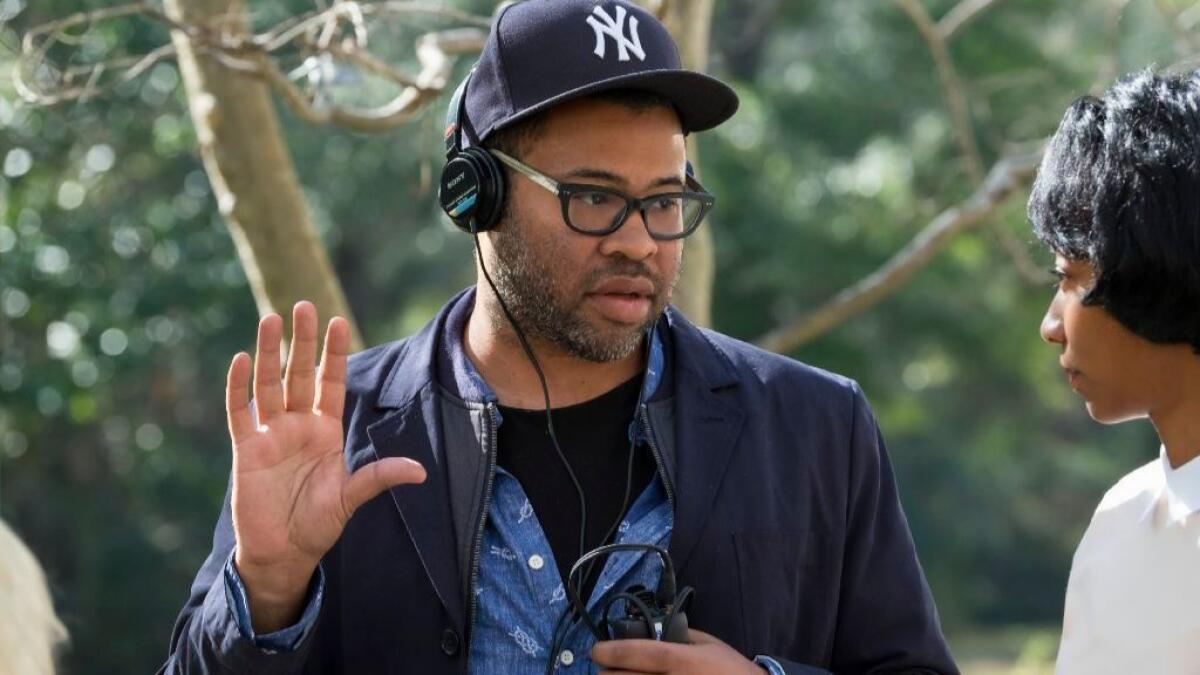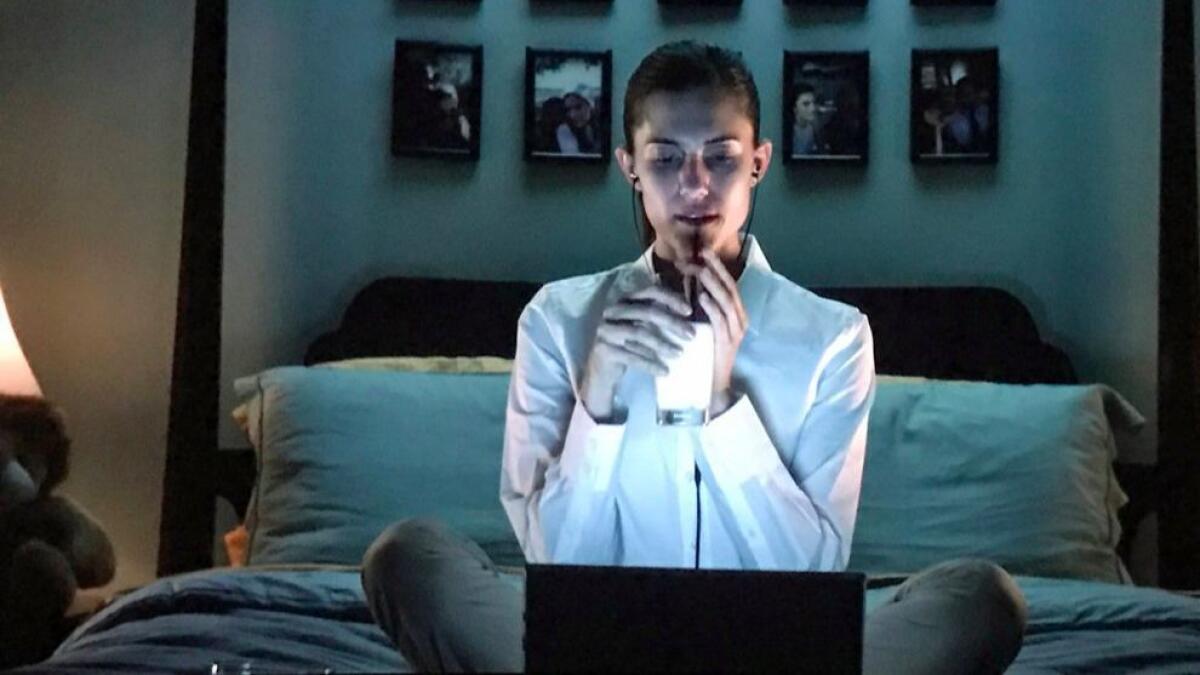Q&A: Jordan Peele on race, RoRo and why you don’t need to tell him you’ve seen ‘Get Out’ three times

Jordan Peele invites me into his office on the third level of a spacious Hollywood Hills home where his production company, Monkeypaw, has taken up residence the last few months. Dogs run free, books are stacked in almost every corner and the walls are filled with art from his Oscar-nominated social thriller “Get Out.”
“Take a seat,” Peele says casually. Then, after a beat: “You recognize that chair, right?”
Peele has just put me in the same leather armchair that Missy Armitage (Catherine Keener) invites Chris Washington (Oscar nominee Daniel Kaluuya) to sit in before she sends him falling into the Sunken Place. Missy’s floral-accented chair is just off to the left; Peele spreads out on a couch across from me.
“I definitely needed to take a couple of things from the set after the movie wrapped,” he says, smiling.
MORE: Out of the sunken place, into the Oscars race: The emotional journey of ‘Get Out’ »
Peele knew the Missy-Chris hypnosis scene would become iconic. But he figured it would take years and, like most horror films, its appreciation would exist on a cult level. Instead “Get Out,” released the weekend “Moonlight” won the best picture Oscar last year, grossed $254 million and became a cultural phenomenon, the subject of endless discussions over its treatment of race and an Oscar powerhouse, earning Peele nominations as a director, writer and producer.
Now Peele, under the Monkeypaw Productions banner, is working hard, indulging his love for horror and the supernatural and boosting representation in genres that historically haven’t been generous toward black people. He’s producing a “Twilight Zone” reboot for CBS All Access and, with Misha Green and J.J. Abrams, an HBO series based on the novel “Lovecraft Country,” a series of interconnected stories that use various classic horror styles to examine the terrors of Jim Crow America.
And he’s writing his next movie.
“I’m in this horror, thriller, parable, ‘Twlight Zone’-y genre, probably forever,” Peele says. “I want to do what Hitchcock did, what Spielberg did, what Brian De Palma did — dark tales.”
Sinking into that armchair, I had some questions.
Daniel Kaluuya told Stephen Colbert recently that now, for black people finding themselves in socially awkward situations, the new version of the movie’s “I would have voted for Obama three times” is “I’ve watched ‘Get Out’ three times.” Do you get that from people?
There’s definitely a truth to it. There is an awkwardness now in navigating situations like the one in the movie where if I’m the only black guy in the room, there’s an extra awareness of how people approach me. Like, “Is this a ‘Get Out’ moment?” It’s kind of fun to watch people squirm. [Laughs]
During awards season, there are probably plenty of times when you are the only black person in the room.
Often it does feel that way, though that’s never really entirely true. I feel like in some small way, because of the response to the film, people are aware of that experience of what it feels like of being the only “other” in a space and, maybe, how the first thing you say to the “other” shouldn’t be in regard to their otherness.
Simply being aware that people may be feeling a little uncomfortable — and not adding to it — is a first step.
Yes. The realization that made me lean into the movie’s premise was the way that we talk about race felt broken and uncomfortable. Conversations would often break down before they began. So I wanted to cut through that awkwardness and discomfort by addressing it. Kind of like when someone goes, “Aaawk-ward” in an awkward situation. In some ways it’s easier to talk about “Get Out” than it is to talk about race. So we can get at some things through that.
Is it easier to talk about race when you have a president who makes racist statements?
We can't suppress the conversation as I felt we did collectively when Obama was president. It felt like we were satisfied with ourselves. Some obviously weren’t satisfied. But for those of us who felt like that was a big moment for change and progress and hope — which, of course, it was — it felt like some people were trying to declare the end of racism. Which is a problem, and a big problem.
Right now, we’re at a time when the conversation about race is alive and it’s often unpleasant. But the art that’s coming out against hatred and violence and bigotry can be the building blocks toward progress — presuming we survive to get to progress.
I love the world of 'Get Out' and I’m open to expanding that world.
— Jordan Peele

Complacency frightens you more than white nationalists marching with tiki torches?
I’m less afraid of the racist who is outwardly racist than I am of the quiet racist sitting next to me on the subway who is thinking these things about me and I don’t know enough to get away from him or try to reason. Silence is the most frightening place in the world to me. And that’s what the Sunken Place is about — the silencing of expression, the silencing of voices. That’s also why it’s important that the Sunken Place, though it’s enforced on Chris by Missy, is really a construct of his own mind and his own personal fears and pain and guilt. That’s an important piece of the puzzle to me.
And you’re getting all this across in a genre movie. From the looks of your upcoming projects, that’s where you’re staying.
My philosophy with Monkeypaw is: no drama. [Laughs] That is probably the one genre I will stay away from as long as possible. I think there are some beautiful dramas, but I don’t seek them out because they’re not as fun. And I also feel that for black artists, particularly in film and television, there’s been kind of a rule that we can only express our truth in drama because of this perceived reverence of drama. I feel you can get at the truth in any genre. And the other genres are, quite frankly, more lucrative. We’ve been teaching young black people, “If you want to tell your story, do it in a drama." No. They can tell their story and get a big audience to watch it as well.
Going back to “Key & Peele,” you’ve always loved puncturing perceived reverence. Isn’t that one reason you made Chris and Rose an interracial couple?
Definitely. People of every race are uncomfortable with interracial relationships and, at the same time, there’s this feeling in pop culture that they are a deeper, more real, star-crossed love and that it’s ignorant to present one that’s less than that. So I subverted that in “Get Out.”
To me, the coolest thing in the world is to use people’s perceptions of cinema against them. Some of those things you can only do once. I can never reveal the white savior to be evil again. The audience would see it coming.
In the DVD commentary, you said RoRo [the real, evil version of Chris’ girlfriend, Rose] was your favorite character. Why?
I’d say RoRo and Georgina [the maid revealed to be Rose’s grandmother] because we built up an intense intrigue of curiosity as to who they are. With RoRo, the moment she reveals she has the keys, you realize there’s this person we haven’t met yet and, from that point forward, every little piece the audience gets is a treasure. You can tell how much I love her from the meticulousness of that Froot Loops scene.
You need to make a stand-alone RoRo movie.
Yes!
You can explore all those previous relationships …
Yes! Yes!

Her penchant for eating dry Froot Loops and drinking milk through a straw …
You’re trying to make me $3 billion right now, that’s what you’re doing. [Laughs] You’re absolutely right. I love the world of “Get Out” and I’m open to expanding that world. The key for me is that it just has to be moving the ball forward. What’s the movie saying? What’s it exploring? It can’t be the same thing.
But, you know, I have pages of the history of the secret society that the Armitages are a valuable faction of. I also have pages on the history of this family from when Dean and Missy first got together, how they raised their children. The Armitage family is a whole creepy movie in itself.
I loved seeing them in that “Behold the Coagula” video Chris watches in the basement.
The first draft of that sequence, I didn’t have the video in. Originally, he was going to be taken down to the room and they would put on “You’ve Got a Friend,” the Carole King song sung by James Taylor. And it’d just be played on repeat. It’s this very pleasant song, a folksy, white liberal anthem of sorts. A beautiful song, but I felt you could subvert that coziness and the audience would never be able to hear the song the same way.
And obviously there’s comedy of forcing a 26-year-old black man to listen to that song over and over and over again. But the idea was, by the time Chris knew every word of the song, by the time he sings along with it, that’s the moment he’s ready for the procedure. Because it was the favorite song of Jim Hudson, the man who bought him, and they needed that knowledge in common in order for the science to work. But I also knew I was not going to be able to afford the song on repeat. [Laughs] So I came up with the “Coagula” video.
I’m looking at this stack of Rod Serling “Twlight Zone” teleplays on your desk. People have tried to revive that show a couple of times without much success …
I was initially reluctant to step into something so revered because … why? There are many reasons not to do it. Or to do it and not call it “The Twilight Zone.” But we felt like we could honor the ground that Serling laid and invented and create a show that could feel like we’re helping him continue his mission today when it’s needed.
You think about the power of allegory, the power of fable in Serling’s time, how daring and bold and subversive it was and how helpful it was to the generation that was there for it. I know it shaped my mother’s imagination. That’s why she introduced it to me. And I think parables are the best way to communicate to human beings.
Jesus would agree.
The Bible is the best episode of “The Twilight Zone” that ever existed. We as a species are very closed off to somebody giving us a lecture or telling us what to do or how to think. But if you give us the breadcrumbs to think for ourselves ...
… from the 40 loaves …
… from the 40 loaves, yes. I was raised Episcopalian. My mother taught Sunday school. I know those parables well.
What are your favorite “Twilight Zone” episodes?
I love “To Serve Man,” which is boring because people would argue it’s the most iconic. “Time Enough at Last" with Burgess Meredith. “Talking Tina,” because as a kid, I loved straight horror. And the Shatner episodes, the one on the airplane but also the one in the diner with the fortune machine with the devil on it. And then one I haven’t seen since we started working on it, so I don’t remember the name of it. It’s the one where a man uses a stopwatch to stop time and the final reveal is he’s about to press it again and he sees the nuclear bomb only inches from the ground.
Looking at all these stacks of books around your office, I’m guessing “Time Enough at Last” has a special resonance these days.
Oh, man, don’t you know it. I have not cracked a dent in many of these. If I had that stopwatch, I would figure some things out right now.
From the Oscars to the Emmys.
Get the Envelope newsletter for exclusive awards season coverage, behind-the-scenes stories from the Envelope podcast and columnist Glenn Whipp’s must-read analysis.
You may occasionally receive promotional content from the Los Angeles Times.




